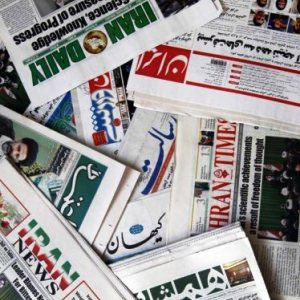Tehran’s Daily Newspaper Review

Supreme Leader Ayatollah Khamenei’s visit to the oil industries capabilities expo and his call for turning the oil industry into the prime driver of Iran’s progress were the top headlines of Tehran’s newspapers today.
“Majles in Worry”. The unexpected u-turn of key members of the parliament and their opposition to summoning Mahmoud Ahmadinejad to Majles was the focus of Iran’s top headline. “Tehran-Baku ties will never fluctuate with passing incidents,” the newspaper quoted the president, who met the Republic of Azerbaijan’s Defense Minister Sefer Abiyev following bitter trading of barbs between the media of the two countries, each accusing the other side of plotting against their security. The newspaper also interviewed a number of legislators who criticized the parliament’s decision to block the government’s plan to increase cash subsidies for citizens.
Disturbing text messages mistakenly sent to ordinary citizens calling them to relinquish their right to receive subsidies have created controversy, while Jomhouri-ye Eslami also reported of a glaring security gap in the data gathering system of the Purposeful Subsidies Plan. “We will take revenge on the blood of Gaza martyrs,” the newspaper---which follows a traditional line on the Middle East affairs---quoted the Palestinian Islamic Jihad, as Israel’s raids on Gaza have led to casualties. “The Second Wave of Islamic Awakening”, the newspaper’s editorial, began with a review of the Arab Spring, continued with strong criticism of the Saudi regime, and prognosticated a second wave of Islamic Awakening which would flood Jordan and Saudi Arabia, where “power-holders … have been basking in their glass towers.”
“Mr. Ban Ki-Moon! Aren’t these violation of the human rights?” Kayhan addressed the UN Secretary General, atop pictures of victims of recent attacks in Gaza, and a shooting spree by a US Service member that led to the death of seventeen Afghans. The newspaper’s editorial argued on how a massive turnout in the parliamentary elections held ten days ago has compelled the United States to modify its Iran policy and stand against Tel Aviv’s cry of war against Iran. The editorial also stated that inside Iran, negotiations with Washington are not a social demand and the White House was misled if it thought it could achieve what if failed to achieve in the election via dialogue.
The last Tuesday night of the Persian Year, Chaharshanbe Souri in Persian, when people indulge in setting off fireworks and in festivities, a tradition frowned upon by many conservative figures since it belongs to the pre-Islamic era, was the topic of Shargh’s top news, which accounted yet another effort by the increasingly popular Dubai to further attract Iranians as the new Persian year approaches.
Tehran-e Emrooz ran another critical report on Mahmoud Ahmadinejad’s economic record, reporting of the government’s refusal to publicize employment facts and figures for the Persian year 1390 (March 21, 2011- March 21, 2012) a year which was supposed to witness the creation of 2.5 million jobs for unemployed Iranians. The second feature report on Tehran-e Emrooz’ front page titled “oversight of urban taxis in the Purposeful Subsidies Bill doubled the expenses,” was support to report on the negative impact of the government’s oversight of urban taxis in the Purposeful Subsidies bill on the business, though the body of the piece failed to illustrate any relation between the two cases.

